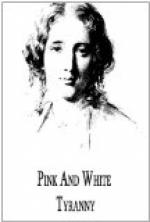This was what Charlie Ferrola meant when he said that the Van Astrachans were obtuse. They never could be brought to the niceties of moral perspective which show one exactly where to find the vanishing point for every duty.
Be that as it may, there, at any rate, she was, safe and sound; surrounded by people whom she had never met before, and receiving introductions to the right and left with the utmost graciousness. The arrangements for the evening had been made at the tea-table of the Van Astrachans with an innocent and trustful simplicity.
“You know, dear,” said Mrs. Van Astrachan to Rose, “that I never like to stay long away from papa” (so the worthy lady called her husband); “and so, if it’s just the same to you, you shall let me have the carriage come for me early, and then you and Harry shall be left free to see it out. I know young folks must be young,” she said, with a comfortable laugh. “There was a time, dear, when my waist was not bigger than yours, that I used to dance all night with the best of them; but I’ve got bravely over that now.”
[Illustration: The Van Astrachans]
“Yes, Rose,” said Mr. Van Astrachan, “you mayn’t believe it, but ma there was the spryest dancer of any of the girls. You are pretty nice to look at, but you don’t quite come up to what she was in those days. I tell you, I wish you could have seen her,” said the good man, warming to his subject. “Why, I’ve seen the time when every fellow on the floor was after her.”
“Papa,” says Mrs. Van Astrachan, reprovingly, “I wouldn’t say such things if I were you.”
“Yes, I would,” said Rose. “Do tell us, Mr. Van Astrachan.”
“Well, I’ll tell you,” said Mr. Van Astrachan: “you ought to have seen her in a red dress she used to wear.”
“Oh, come, papa! what nonsense! Rose, I never wore a red dress in my life; it was a pink silk; but you know men never do know the names for colors.”
“Well, at any rate,” said Mr. Van Astrachan, hardily, “pink or red, no matter; but I’ll tell you, she took all before her that evening. There were Stuyvesants and Van Rennselaers and Livingstons, and all sorts of grand fellows, in her train; but, somehow, I cut ’em out. There is no such dancing nowadays as there was when wife and I were young. I’ve been caught once or twice in one of their parties; and I don’t call it dancing. I call it draggle-tailing. They don’t take any steps, and there is no spirit in it.”
“Well,” said Rose, “I know we moderns are very much to be pitied. Papa always tells me the same story about mamma, and the days when he was young. But, dear Mrs. Van Astrachan, I hope you won’t stay a moment, on my account, after you get tired. I suppose if you are just seen with me there in the beginning of the evening, it will matronize me enough; and then I have engaged to dance the ‘German’ with Mr. Endicott, and I believe they keep that up till nobody knows when. But I am determined to see the whole through.”




